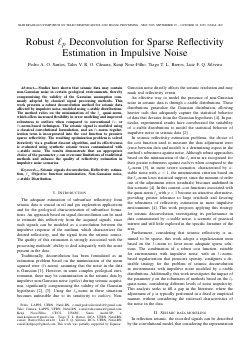
Robust \( \ell_p \) Deconvolution for Sparse Reflectivity Estimation in Impulsive Noise
Pedro Arthur Oliveira dos Santos, Tales V. R. O. Câmara, Kenji Nose Filho, Luiz F. Q. Silveira, Tiago Barros
DOI: 10.14209/sbrt.2025.1571154504
Evento: XLIII Simpósio Brasileiro de Telecomunicações e Processamento de Sinais (SBrT2025)
Keywords: Seismic signal deconvolution Reflectivity estimation Non-gaussian noise Alpha-stable distribution
Abstract
Studies have shown that seismic data may contain non-Gaussian noise in certain geological environments, thereby compromising the validity of the Gaussian assumption commonly adopted by classical signal processing methods. This work presents a robust deconvolution method for seismic data affected by impulsive noise, modeled using \( \alpha \)-stable distributions. The method relies on the minimization of the \( \ell_p \) quasi-norm, which offers increased flexibility in error modeling and improved robustness to outliers when compared to conventional \( \ell_1 \) or \( \ell_2 \) -norm-based techniques. The seismic signal is modeled using a classical convolutional formulation, and an \( \ell_1 \)-norm regularization term is incorporated into the cost function to promote sparse reflectivity. The resulting optimization problem is solved iteratively via a gradient descent algorithm, and its effectiveness is evaluated using synthetic seismic traces contaminated with \( \alpha \)-stable noise. The results demonstrate that an appropriate choice of the parameter \(p\) can overcome limitations of traditional methods and enhance the quality of reflectivity estimation in impulsive noise scenarios.Download